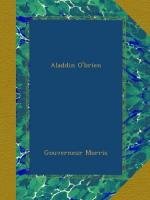“Somewhere,” he said, “in this transcendentally beautiful continent, Aladdin, there may be some one that feels worse than I do, but I doubt it.” He turned to go.
“Won’t Mr. Orde be here either?” said Aladdin.
“No; he’s home in bed. You’re editor-in-chief and everything else for the day, see? And I wish I was dead.” Mr. Blankinship nodded, very slightly, for it hurt, and went out.
The misery of others is a great cure: with the first sight of Mr. Blankinship, Aladdin’s headache had gone, and he now pounced upon fresh paper, got a notion out of the God-knows-where, wrote his editorial at full speed, and finished it without once removing the cigar from his mouth.
He had just done when the shrewd, inky little boy, who did everything about the “Spy” offices which nobody else would do, entered and said that a gentleman wanted to speak with Mr. O’Brien. Aladdin had the gentleman shown up, and recognized the oldest of Hannibal St. John’s sons; he knew them well by sight, but it so. happened that he had never met them. They were the three biggest and most clean-cut young men in Maine, measuring between six feet three and four; erect, massive, utterly composed, and, if anything, a little stronger than so many dray-horses. They were notable shots, great fishermen, and the whole State was beginning to speculate with excitement about their respective futures and the present almost glittering success of the law firm which they composed. The oldest was the tallest and the strongest. He had been known to break horseshoes and to tear a silver dollar in two. Iron was as sealing-wax in his huge hands. His habits were Spartan. The second son was almost a replica of the first—a little darker and a little less vivid. The third was like the others; but his face was handsomer, and not so strong. He was of a more gentle and winning disposition, for his life was not ignorant of the frailties. The girl to whom he had been engaged had died, and that had left a kind of sweetness, almost beseechingness, in his manner, very engaging in so tall and strong a man.
“Mr. O’Brien?” said John St. John.
Aladdin arose and held out his long, slender hand.
Aladdin had a way of moving which was very individual to himself, a slight, ever so slight, exaggeration of stride and gesture, a kind of captivating awkwardness and diffidence that was on the borderland of grace and assurance. Like all slender people who work much with their heads, he had a strong grip, but he felt that his hand was as inconsistent as an eel when St. John’s closed over it.
“I came in for a moment,” said St. John, “to say that we are all exceedingly grateful to you. Your song was a great factor in my father’s reelection to the Senate. But we do not hold so much by the song as by the good will which you showed us in writing it. I want you to understand and believe that if I can ever be of the slightest service to you, I will go very far to render it.”




